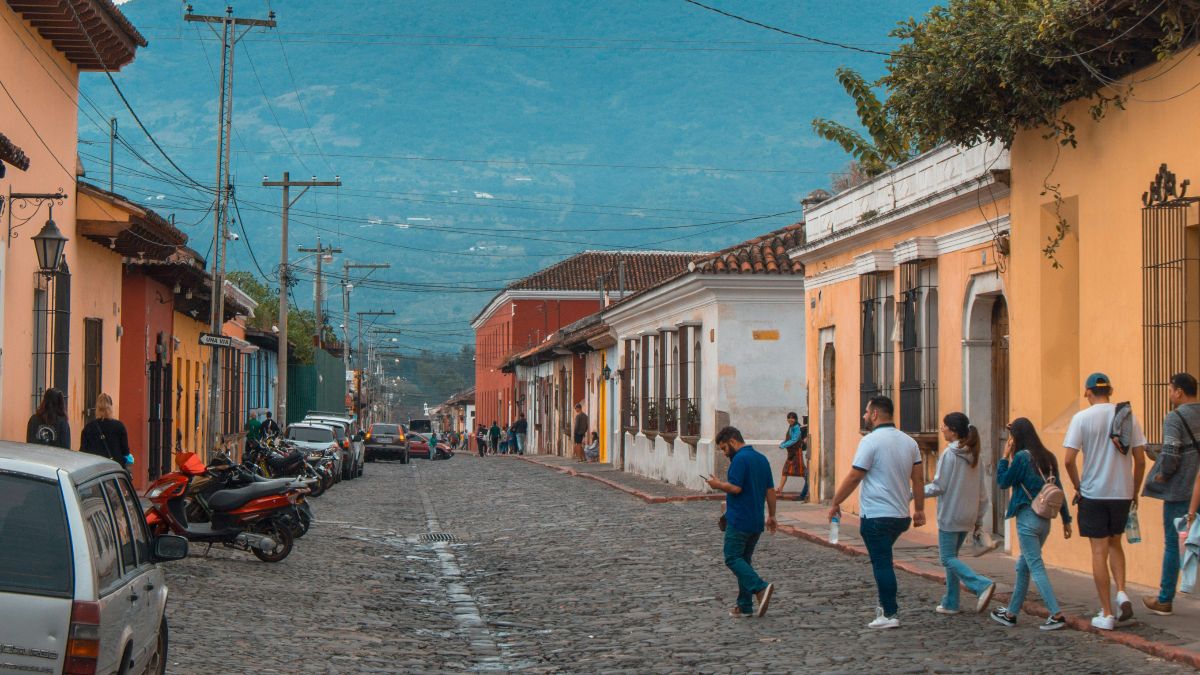Learning Spanish in Central America is essential for truly knowing the region, and unfortunately not enough expats and tourists bother to try. New languages are hard to learn but the payoff is worth the hardship. This article contains a link (or links) to Amazon, from which, as an Amazon Associate, this website will earn a small commission if you make any purchases.
Unless you’re in Belize, chances are you’ll hear a lot of Spanish in Central America.
Actually, even in Belize, more people speak español nowadays and Caribbean communities elsewhere are pretty much bilingual, or even trilingual (English, Creole/Kriol, Spanish).
The point is, even in those places, learning Spanish helps you become part of your community.
It ensures people will show you more respect once you’re in Central America.
Respect is a significant feature of Latino life. If you’re respected as something more than some gringo tourist, you’ll get along better in this part of the world.
Respect also works both ways. You do want to pay your new home the courtesy of having a basic conversation with any person in it, right?
I’ve been in Costa Rica since 2000. My foreign language skills were zero when I arrived. At school I had done basic French and German – I hated both classes – and I had no Spanish whatsoever outside of ordering a beer in some bar or club in Ibiza or whatever.
Now, many years later, I’m…. well, not fluent (fluency requires the ability to think and dream in the language, and to speak without thinking about it and without translating everything you’re trying to say back into your mother tongue – At least that’s MY definition of fluency)… but I can chat in Spanish about pretty much anything with pretty much anyone. And that’s enough to open doors and make life easier.
When you’re learning Spanish, you need to go to cities that speak crystal-clear Spanish…
Do NOT go here:
– Santo Domingo 🇩🇴
– Barranquilla 🇨🇴
– Santiago 🇨🇱
– San Juan 🇵🇷
– Havana 🇨🇺
– Buenos Aires 🇦🇷Instead, go to:
– Bogota 🇨🇴
– Mexico City 🇲🇽
– Guadalajara 🇲🇽
– Antigua 🇬🇹— Jake Nomada 🌎 Read Pinned Tweet (@JakeNomada) December 2, 2022
So how did I do it?
Well, one thing this article isn’t is A Quick Guide To Learning Spanish Like A Boss. It isn’t a guarantee that if you read this article and do this, this, and this, you’ll be up there singing old Marco Antonio Solis songs at your local karaoke bar within the next two months better than the big man himself.
(Note: Marco Antonio Solis helped me big time with learning Spanish. Big time. Plus the man’s a don and the ladies love him.)
Neither is it where I say that if you stick around here as long as me, you’d be dumb as a rock if you couldn’t learn Spanish. I know enough gringos in Central America who have been here way longer than me and still can’t speak any Spanish. They’re not all stupid.
So between the “Quick Guide” format and the “Do Nothing But Wait And It Will Come” format there’s a middle ground. And that’s where I am.
When I first arrived I took some basic Spanish classes once I figured out I’d be staying for a while.
I can’t lie and say those classes worked for me – like back at school, I loathed them. Verbs, verb tables, conjunctive adverbs, prepositions, participles. Jesus, I’m getting bored writing these terms down right now.
I had about three months of classes and came out of them speaking not much more Spanish than when I started them. I had no idea about the structure of Spanish or any of that crap. And I didn’t care. I’m not a linguist. I was useless.
One thing I could do was order a beer in Spanish, though. I knew that much. So that’s what I did – I ordered beers. While ordering beers and sitting in bars drinking them, I spoke to people. In Spanish. (Other drinks apart from beer are available, as are other activities outside of sitting in bars.)
And that was what did it for me. Just speaking to people. Just socializing. You make mistakes and continue to make mistakes but you still speak to people. There’s no magic fix here.
You either attempt to speak to people in Spanish or you don’t, no matter how bad your basic Spanish is. You get on with it.
This is why you see all these language schools in Guatemala offering total immersion programs.
Total immersion is where the student lives with a family for a while who cannot (or will not) speak one word of English to him or her. The student lives for weeks or months without hearing a single word of English (or French, German, whatever).
The classes might delve into the boring grammar stuff but the substantive lessons come from the total immersion. It’s not for the lighthearted.
My immersion wasn’t total back then otherwise my Spanish would be way better now. But I still went for days or even weeks at a time without speaking much English.
I read books in Spanish – kids’ books like Winnie the Pooh, Dr. Seuss, and Harry Potter are great. I also watched TV, especially the news and the telenovelas. Betty La Fea helped me more than she’ll ever realize. Today, you can switch Netflix to Spanish (or at least to Spanish subtitles) if you want. See how that subconsciously improves your Spanish.
“If you’re interested in a Spanish immersion program abroad, it’s worth considering where. #CostaRica, #Peru, and #Guatemala are all excellent places to study “neutral” Spanish. But for the linguaphiles among us, it’s still interesting to consider some of the regional differ… pic.twitter.com/z5Oh1DAtvz
— MAXIMO NIVEL (@maximoabroad) July 29, 2022
I came out the other side speaking Spanish like a boss (well, maybe like a head of department rather than a boss), even though I hadn’t exactly conquered Spanish. I still haven’t conquered Spanish.
There’s also a downside here, doing it my way, and I would be remiss not to mention it.
Although I can speak and read Spanish, I still – after all these years – have major problems writing in Spanish. I mean, I can write in Spanish, más o menos, but it sure don’t look pretty.
More time and effort in formal lessons would have enhanced my written language skills way beyond where they are today.
One thing I do – and this isn’t a deliberate strategy, more like a natural occurrence – is always speak to someone in the language I first met them.
For example, my wife and I met in Spanish, and to this day, that’s our language, even though she can speak English. I have Costa Rican and other Latin American friends and colleagues who I met in English, and we still always speak English.
It somehow works that way, and it’s weird to speak in any other language. I guess kind of like how turtles always go back to the beach of their births to lay their eggs?
Something I think totally ridiculous is two gringos speaking together in Spanish, pretending to each other and themselves they’re native speakers. If it works for you, go for it. But not with me as I’ll laugh at you. Don’t be that person around me, please. Don’t go Full Latino. No-one will respect you if you do, and as already mentioned, respect is key down here.
So here’s the deal. If you want to live down here and learn the language, you’ll need to speak it at some point.
Let go of your inhibitions and dive in. There’s no magic formula. Do programs like Rosetta Stone and Duolingo help? They sure can. I never tried them myself, but they can help. Try them out, but the important thing is, once you’re here GET OUT OF YOUR GRINGO BUBBLE AND TALK TO PEOPLE!
If you do that, I promise you will make it. It might take 18 years or 18 months, but you’ll get there.
New to Spanish? Here’s what you need to know to feel comfortable in any conversation: https://t.co/CO1RHi8wKp
— Rosetta Stone (@rosettastone) November 18, 2022
Life is so much more enriching speaking Spanish in Central America.
I already pointed out the appreciation and respect you’ll receive. This will far surpass the effort it takes during those initial few months or years of trying.
Most Central Americans – especially in countries with lots of gringos like Costa Rica – will assume you’re a tourist who can’t speak the local idioma. That’s an automatic and well-founded assumption.
Proving them wrong is always delightful, both for you and for them. Chances are you’ll make a friend. If you’re single you’ll have a better chance of meeting someone.
If you know your way around local media, social media, and local TV, you’re also informed. You’ll know more than the average expat. This knowledge goes a long way to turning a country where you’re staying into a country where you’re living.
An illustration here are the presidential elections every four years in Costa Rica. Every time they come around, the English-language expat groups on Facebook are full of people with no idea what is happening. How can they call Costa Rica home if they don’t know what’s taking place around them? How invested are they in Costa Rica?
Learning Spanish and then speaking and listening to Spanish in Central America separates the pros from the amateurs.
Again, if you read this thinking looking for some quick fix to your language problems, I apologize.
There’s no quick fix. But that’s what makes it so satisfying when you realize halfway through a conversation you’ve spoken no English at all during the exchange.
That’s a wonderful feeling the first few times it happens. But it’s a greater feeling when it’s the norm and not the exception.
James Dyde is the editor of CentralAmerica.com. He lives in Escazu, Costa Rica.




